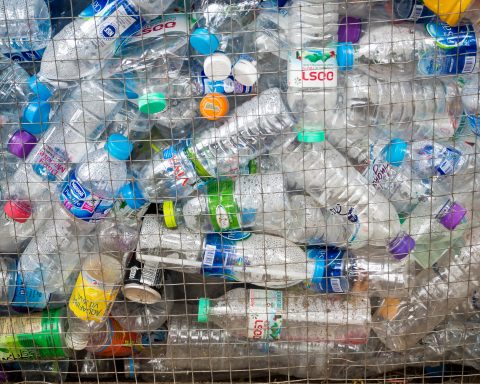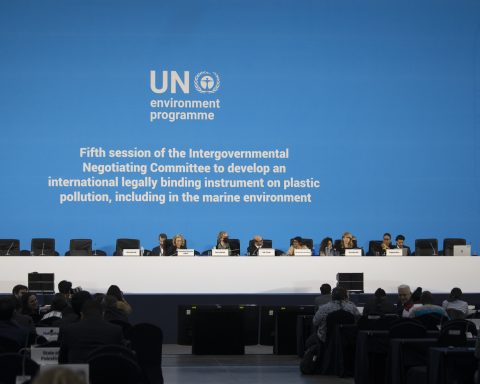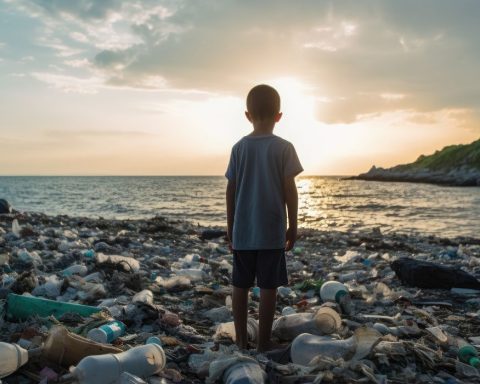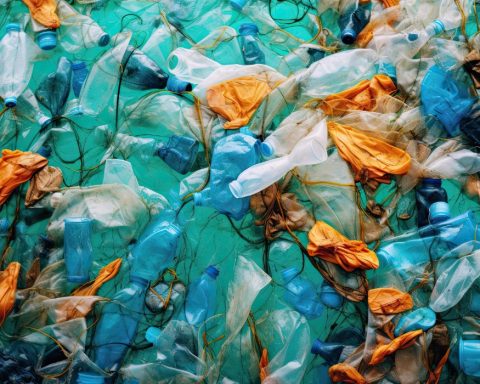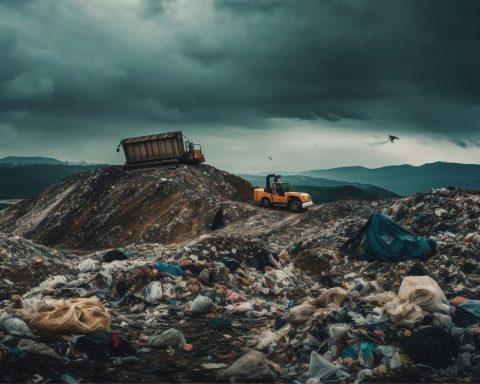On a sweaty Sunday in August at Toronto’s Woodbine Beach, swarms of people flock to the lake’s edge trying to escape the world’s woes, at least for an afternoon. But scan the (mostly) socially distant gaps between the beach towels and lawn chairs and you’ll find telltale signs of the summer of COVID. Record levels of dumped takeout cups, forks, straws and pale-blue disposable surgical masks dot the sand just inches from the waterline.
Just when the movement against single-use plastic was picking up steam, COVID-19 scared us into consuming 250 to 300% more single-use plastic than we used pre-pandemic, according to estimates from the International Solid Waste Association. A good chunk of that has been tough to avoid: particularly the 129 billion face masks and 65 billion gloves now used globally every month. Of course, we’re also valiantly fulfilling our civic duty to stay home and binge-watch Netflix while ordering record levels of plastic-wrapped deliveries – which explains how Uber Eats revenue grew by 103% in the second quarter of this year and Amazon earnings surged by 40%. Not surprisingly, Ontario reported that residential waste was up the equivalent of “more than 600 full garbage trucks” for the period of March 9 to April 13 alone.
It’s no wonder that while the global lockdown sent oil profits plunging, some oil refiners are betting big on a more promising long-term market: petroleum-based plastics. As Oilprice.org recently noted, from India to China, “Asian oil producers have begun to double down on massive integrated refineries capable of converting more than a million barrels of oil per day into petrochemicals, the key building blocks of plastics.” With plastic set to become the largest driver of oil demand, the sector’s emissions could reach a whopping 1.34 gigatons per year by 2030 –that’s equivalent to the emissions released by more than 295 new 500-megawatt coal-fired power plants, according to the Center for International Environmental Law.
Summer 2020 has also delivered a string of disheartening reports on some of the victims of our plastic habits. This week, the Associated Press reported that as Big Oil pivots to plastic, it’s also pressuring Africa to accept a flood of plastic waste. And according to research published last month in Nature, more than 10 times as much plastic debris is hidden beneath the surface of the Atlantic Ocean than we previously thought. That includes about 200 million tonnes of microplastic particles swirling around the frigid Atlantic. Also hot off the summer newswire: micro and nanoplastics are turning up in every human organ and tissue sample, as well as those of shark and seafood, tested. Did I mention that even without COVID, the annual flow of plastic into the ocean is on track to nearly triple from 2016 to 2040?
Worse still, a report from the Pew Charitable Trusts and Systemiq concluded that even if governments around the world meet all their pre-pandemic commitments to ban plastic straws and bags and major corporations stick with their pledges to ensure that all their plastic is recyclable, reusable or compostable by 2025, it will put only a 7% dent in all the plastic destined to pour into our seas by 2040.
But honestly, there’s only so much doom-scrolling the average person can handle before we need some clear signs from business, government and civil society that plastic pollution solutions are at hand.
So now what? Building back better by closing the loop on plastic
Thankfully, there are glimmers of hope on the horizon. Incoming federal Finance Minister Chrystia Freeland has signalled that her government plans to push ahead with a green economic recovery when Parliament reconvenes in September, joining the EU, South Korea, Chile and other nations that are pledging to build back more sustainably.
To shift from our current reality, where Canada sends 87% of plastics to landfill every year (trashing $7.8 billion worth of plastics annually), to a thriving zero-waste economy, that green recovery package will need to tie stimulus spending to low-carbon, circular-economy goals. In Ontario, a coalition of 52 environmental groups has put forward a number of ideas the whole country should consider. They’re urging Ontario to start making recycling mandatory for industrial, institutional and commercial sectors (now responsible for 65% of all waste) and to ensure that all recycling costs are covered by packaging producers, not cash-strapped municipalities. The groups – including the Canadian Environmental Law Association, Environmental Defence, the David Suzuki Foundation and dozens of green non-profits – are also pushing for incentives for producers to design out waste as well as minimum-recycled-content targets.
The Recycling Council of Ontario says that mandating strong minimum-recycled-content requirements will help revive Canada’s domestic recycling infrastructure. Plastic just so happens to be Canada’s fastest growing manufacturing sector – but much of that ($10 billion worth annually) is focused on making virgin plastic, according to a study commissioned by Environment and Climate Change Canada. Rapidly falling oil prices have only made virgin plastic cheaper, which has been bad news for recycled plastic. To combat that imbalance, the EU is moving to slap a tax on non-recycled plastic packaging in the new year. A Corporate Knights white paper on building back better by greening industry suggests that the federal government can encourage new circular, zero-waste facilities with tax incentives, as well as clear regulations and procurement policies that support zero-waste businesses.
An upcoming Oceana Canada report has more helpful advice for the feds, like banning all trade of virtually unrecyclable plastics to developing countries so we stop fuelling plastic pollution problems around the globe.
If the feds want to build back better, advocates all seem to agree on one thing: Canada needs to move ahead with its commitment to ban unnecessary single-use plastic products by next year. In the early days of the pandemic, the plastic industry urged North American cities, states, provinces and grocery chains to put their plastic bag bans on pause, calling them “a public safety risk.” It’s since become clear that plastic lobbyists were wrong about a couple of things. Studies have found that COVID lives three times longer on plastic surfaces (including disposable bags and food wrappers) than paper. And, either way, scrubbing down our plastic-wrapped groceries with disinfectant wipes has turned out to be more misdirected anxiety than anything else, since COVID is largely an airborne virus. (More than 100 virologists, epidemiologists and doctors from 18 countries released a statement in June noting that “single-use plastic is not inherently safer than reusables.”)
But COVID-19 has made Canadians nervous. New polling from Dalhousie University found that while 79% of Canadians still want stronger regulations on plastic, many of us admit to buying more single-use plastic food packaging during the pandemic, and 52% feel regulations should wait until after COVID-19 is resolved. Nonetheless, jurisdictions from New York to Newfoundland and Labrador are now moving ahead with bans on single-use plastic bags that were paused during the pandemic. Some, like PEI and Sobeys, never suspended their bans – and neither should the rest of Canada.
Combine those bans on problematic plastic with deeper systemic shifts to a fully circular economy and the Pew/Systemiq study suggests that the amount of plastic flowing into the oceans could be slashed by up to 80% over the next 20 years. That would be good news for the Great Lakes too, which are now flooded with 10,000 tonnes of plastic every year.
This time last year, hundreds of mayors, heads of state and CEOs around the world were tripping over each other to proclaim that they had seen and heard the public’s outcry against plastic pollution. Fast forward 12 months and there’s no denying that COVID-19 has set back the movement against single-use plastics, but the pandemic could, in the long run, be helpful –
– if we take this breather to reflect, hit reset and build the future we want. That means Canada needs to ensure our economic recovery plans have green strings attached – fully reusable strings, of course.
Back at Woodbine Beach, a couple of us pull out garbage bags and stop to pick up whatever litter we can, trying to stem the flow of trash washing into our waterways. We’re heading back for another clean-up Sept. 20. It’s a small act, but if business and government pitch in to build a truly zero-waste economy that spits out less single-use straws, cups, forks and, yes, masks, we can start turning the tide.
A version of this story appeared in the Toronto Star.



